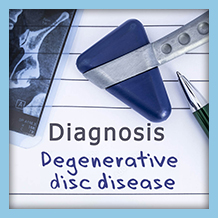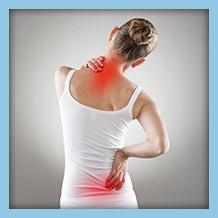

The Florida experts at Orthopedic and Laser Spine Surgery encourage you to protect your spine’s health by understanding degenerative disc disease (DDD), the different types of symptoms it causes, and the treatments available.
What is Degenerative Disk Disease?
Degenerative disc disease is a principal reason behind neck and low back pain. It’s also one condition that is the most misunderstood.
Simply put, DDD refers to neck and back pain symptoms due to wear and tear of the spinal disc. In some instances, DDD also leads to radicular pain (burning, shooting pains in the legs or arms), numbness, and weakness. Degenerative disc disease usually consists of lower-level chronic pain with sporadic severe pain episodes.
Degenerative Disc Disease Symptoms
Degenerative disc disease’s most indicative symptom is a continuous, low-grade pain around your degenerating disc that flares up occasionally into more serious, potentially disabling pain. These flare-ups of pain can be due to recent activity and irregular stress placed on the spine, or they can occur suddenly without apparent cause. Flare-up episodes can last several days to several weeks before they turn back to low levels of pain, or they can go away entirely temporarily.
In some cases, a degenerating spinal disc doesn’t always result in pain or other types of symptoms. Since the disc itself has minimal innervation, typically, pain is generated when the degenerating disc impacts other spinal structures (i.e., joints, muscles, nerve roots).
Causes of Degenerative Disk Disease
Pain linked with DDD typically stems from a couple of primary factors:
1. Inflammation
The disc space interior has inflammatory proteins that can leak out as the disc degenerates. This causes swelling in the spinal structures that surround the space. This inflammation can cause:
- Muscle spasms
- Muscle tension
- Local neck or back tenderness
If a nerve root becomes inflamed, numbness and pain can radiate into the leg or hips (lumbar radiculopathy, in instances of lumbar disc degeneration) or shoulder and arm (cervical radiculopathy in instances of cervical disc degeneration).
2. Abnormal Micro-Motion Instability
The support and cushioning of a disc generally provide reduced as the outer layer of the disc (the annulus fibrosis) degenerates and leads to unnatural, small motions between vertebrae. The micro=motions can lead to irritation and tension in the surrounding joints, muscles, and/or nerve roots as the segment of the spine becomes more progressively unstable. This causes sporadic episodes of intense pain.
Treating Degenerative Disc Disease
Treatment for painful DDD focuses on stabilizing the spine, reducing the pain, and maintaining or improving mobility. Doctors can typically treat degenerative disc disease with a combination of physical therapy, pain management approaches, and other methods.
Surgery for Degenerative Disc Disease
In the case of debilitating, severe lumbar degenerative disc disease, surgical treatment is an option and is typically only recommended after a minimum of six months of conservative, non-surgical treatment. Most DDD cases can be managed well with the use of non-surgical approaches and don’t require surgery for pain relief.
Non-surgical approaches are generally recommended for no less than six to 12 weeks before the consideration of surgery, although often, non-surgical approaches are used for a lot longer. Estimates show that only around 10% to 20% of lumbar DDD cases and up to 30% of cervical DDD cases aren’t treated successfully with non-surgical approaches and surgery to improve mobility and relieve pain.
A couple of types of degenerative disc disease surgery options include:
1. Lumbar Spinal Fusion Surgery
Fusion surgery is the standard surgical treatment for lumbar DDD, where the surgeon grafts two vertebrae together. The goal of this type of surgery is to reduce pain by eliminating spinal segment motion.
Fusion surgeries can differ in the way the surgeon approaches the spine and the tools or techniques they use to fuse the joint. However, all spinal fusion procedures involve the following:
- The surgeon removes the affected spinal disc entirely from the disc space (discectomy).
- The surgeon puts the set-up for fusion in place, which can involve a bone graft and/or tools that stabilize the spine further, such as plates, implants, and/or screws connected to the two fused vertebrae.
- The vertebrae fuse together and change the joints to an immobile, solid structure. Fusion occurs in the months after the surgery, not during the surgery itself.
The spine surgeon will likely prescribe pain medication, physical therapy, and/or a back brace following the procedure to manage pain and helping to strengthen the low back while the spine is healing. Recovery can take up to a year as the spine heals and the vertebrae grow together.
2. Artificial Disc Replacement Surgery
This procedure was developed recently as a spinal fusion alternative. An artificial disc replacement procedure involves a discectomy (removing the full spinal disc), bringing the disc space back to a natural height, and artificial disc device placement.
The surgery is intended to maintain spine movement similar to natural motions, decreasing the likelihood of enhanced pressure being placed on adjacent spinal segments. Artificial disc replacement surgery recovery generally lasts up to six months while your body is healing from surgery and your spine is adjusting to the device.
Contact the Experienced Florida Back and Neck Specialists at Orthopedic and Laser Spine Surgery Today
If you’re suffering from degenerative disk disease, you have treatment options and don’t have to deal with the pain. Orthopedic and Laser Spine Surgery can help you come up with a treatment plan for your DDD, whether it’s conservative, non-surgical approaches or degenerative disk disease surgery. Either way, you can schedule a consultation to start the process of your evaluation and treatment option planning.
Our team of back and neck specialists here at Orthopedic and Laser Spine Surgery in Florida will address your pain with compassionate care. Call our office today at (855) 853-6542 or fill out our contact form on our website to set up your appointment.
